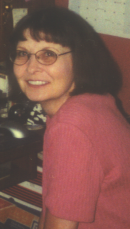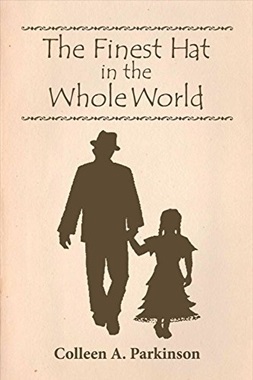Please welcome this week’s guest to the Showcase.

My earliest memory is the expression of pride and joy on my mother’s face as I walked (more like “tottered”) into her outstretched arms. I find it rather strange that the memory of that event always comes to me in black and white instead of color. Maybe I could only see in black and white back then, or maybe it’s because we had a black and white television that seldom worked because the tubes kept wearing out. When it worked, I sat cross-legged on the floor with my two sisters watching reruns of “I Love Lucy,” “Captain Kangaroo,” and every Shirley Temple movie that was ever made. My mother loved Shirley Temple. She loved her so much she actually had created her own Shirley Temple scrapbook when a teen in Hawaii. I don’t recall for certain, but I believe she often watched those movies with us when she wasn’t busy doing laundry for her eight children; in the count, I was number seven.
Although television had a profound effect on my later desire to become an actress and possibly even write screenplays and television shows, it was books that introduced me to a media that I had a better (so I believed at that time) chance of succeeding at. My mother and father were avid readers. We had a bookcase full of children’s books, novels, medical books (Mom wanted to be a nurse at one time), How-To books, and even some textbooks my brothers had never returned to their school at the end of the year. One of those books was about Psychology, and it fascinated me. I perused many of these books as soon as I learned to read. I can’t count how many I read over the summers when the T.V. sat dormant with another blown tube, but I know it was a lot. The first grown-up novel I read was called, “The Texas Rangers.” I read that when I was seven. Read the whole thing. Loved it. My brother Patrick, thinking I didn’t really understand it, asked me to describe the story. I did. He was surprised that I actually understood what I had read. I went on to other books, and I paid attention to not only the quality and mechanics of the writing, but the mechanics of punctuation, too. One of my teachers actually told my classmates I was the only one in her class who knew how to write dialogue with proper punctuation. That made me proud. I got beat-up later for it.
My elementary school had a school newspaper, and they were looking for material. I wrote a series of short stories about two midget detectives who solved crimes. (Please don’t yell at me for using the word “midget”—that was the word in use at the time.) Anyway, that series was a big hit with the students, and my older brothers Patrick and Tim encouraged me to keep writing. So, I kept writing. I even kept writing while in the hospital after a major surgery for an intestinal condition that almost killed me when I was ten. I wrote stories for the doctors and nurses, and they passed them around. I was the Surgical Ward’s little celebrity, their “author in residence.” Their enthusiasm encouraged me further.
Often, life doesn’t proceed the way we want it to, and my life took many turns and frightening dips. Ongoing health issues, however, provided me with an opportunity to attend college through a special program. It was there I honed my writing skills, and there I rediscovered my love for theater and film. My first theatrical play, “The Injured Child,” was accepted and performed by a local theater group. The producer, considering the fact it was a drama about two children living with a volatile alcoholic parent, cautioned me not to get my hopes up that it would attract substantial audience attendance. I had already expected meager attendance. No one was prepared for the reaction it got on opening night and the full houses that followed. The dang thing went on to win a theater award the following year. Who woulda thunk it?
Now I’m much older and retired with time to write novels. I love writing novels. I love writing complicated characters with realistic flaws. I love life-affirming endings. I love that feeling I get when I type “THE END” on my final draft. What I love even more is getting feedback, complimentary and critical, from readers of my work.
What I don’t love is the marketing aspect. What a pain! Yet, the more I work on marketing, the better I become at creating a hook and a compelling synopsis. That in itself is another aspect of writing that all writers need to master. Do most writers make a lot of money? Nah… You can’t do it for the money; you do it because it makes you happy. You do it because, the more you write, the better writer you become. That’s why I write.
HELL IS IN ME
A boy, a girl, a neglected cemetery, and a town’s terrible secret.

Quinn Vanderfield hates his life. His mother is dead, his father is a work-obsessed alcoholic, the school bullies torment him, and the dead seek his help. It is the latter that elevates his teen angst well above the norm. It is his secret. Considering the living more trouble than the dead, he leads a solitary existence finding transient joy in old movie musicals, Big Band and Jazz music, and restoring the historic pioneer cemetery owned by his family.
Quinn’s life takes a turn for the better when his new neighbor, fellow teen Stephanie Norris, challenges his self-imposed isolation as she befriends him through their shared love of antiques and their mutual grieving over lost loved ones. Caleb Anders, a young local contractor and former caretaker of the Norris property, who has his own secrets to hide, gives Quinn the big brother guidance he needs. Quinn discovers his strengths and the healing power of friendship when Stephanie enlists his assistance to solve the decades-old murder of Isaac Iversen, one of her ancestors, and Caleb finds himself troubled by the dead. Frustration and terror ensue when Jake Sheers, the psychotic ghost of the suspected killer, also demands Quinn’s help.
Adding to Quinn’s problems, the town bullies he has dubbed “The Fermented Four,” continue to hassle him. They are bent on revenge after Quinn retaliates. Their vengeance escalates when one of their own breaks ties with them to date Stephanie.
Will Quinn convince Stephanie she is making a mistake? Can Quinn uncover the truth about Isaac Iversen’s murder? What is Caleb’s connection to it? How can he release crazy Jake, who is slowly regaining his physical body, from his earthbound state before it’s too late?
Written for older teens and adult readers, “Hell Is In Me” is a story of buried family secrets, a town’s sorry past, one family’s deception, one family’s mercy, the agony of love lost, and the struggle for retribution, redemption and reunion across time and space.
THE FINEST HAT IN THE WHOLE WORLD

Des Stewart sees himself as a loser in life and love. Haunted by tragedy, trapped in a dead-end job and responsible for the care of his aging mother who is slipping into senility, he can not envision a brighter future for himself. A new challenge arises when his troubled and volatile niece Phena is left in his care.
Set in the years 1917 through 1937, “The Finest Hat in the Whole World” is an unforgettable story of one man’s opportunity for redemption and one child’s coming of age into womanhood.
Her name was Josephine,
but everyone called her Phena. She didn’t know why they called her that, but she was so accustomed to the nickname, she hadn’t bothered to ask. She liked that her name was unique. There were too many Marys, Anns, and Sarahs in the world. There were five Marys in her class at school, and they all raised their hands when the teacher called out that name, but when the teacher called out, “Phena,” she was the only one who raised her hand.
Today she should have been in school, but instead, she was on a train. She used to find the rhythm of the train soothing. Now it seemed to jostle her with a wicked intent to keep her stirred up.
It was her fourth ride on a train. The first two times it was exciting to her, and she was riveted to the sight of the countryside and mysterious little towns outside the big windows. Back then the scenery inspired her imagination, and she conjured up new existences filled with adventure, beauty and people who were always kind. The third time she rode the train, she cried because she was leaving Pa’s family behind, and Pa had said it was for keeps. Pa never explained why he was uprooting her and her siblings and Ma, and the mystery surrounding the reason only made it worse for Phena. On that journey she spent most of her time crying and thinking about the past, the place, the people, and the happy life she was leaving behind. During that trip, she dared not imagine the future, for the future seemed hidden far within a foreboding black tunnel she was afraid to enter. This time, however, she had a clear idea of her destination, and only a dim realization of why she was on this train. The gravity of her present situation influenced the darker side of her imagination.
She imagined Grammy, Uncle Des and Aunt Ellen wouldn’t want her. She imagined her pa, not knowing what else to do with her would dump her off at the nearest orphanage and she’d never see him again. She imagined her ma was glad to be rid of her. She imagined her sisters and two brothers would not miss her.
Actually, her siblings had no idea she was gone yet.
Pa had rousted her out of bed at four o’clock that morning and told her to get dressed. After she dressed and met her father in the kitchen, she saw a suitcase on the wood floor by the back door.
“You’re gonna live for a while with Uncle Des,” he told her, “Until your ma gets better.” The tone in his voice was aloof. No one was awake in the house except her and Pa. Although it was obvious to her, she had to verify it. “Just me?”
He finished his coffee, stood and took up the suitcase. Then he went to the back door and wrapped his hand around the knob. “Put on your coat.”
She stared up at him. Her father, tall, thin and muscular, always seemed like a giant to her. She felt insignificant in his presence; as if she was a bug he could squash with his big foot if he wanted to. Yet, he was a gentle person, easily moved to laughter – at least, with adults. He was different with his children, not mean, but distant, even a bit uncomfortable. It seemed to Phena that children were an ominous mystery to him, little rocks better left unturned in case a monster dwelled beneath.
He noticed she was staring at him. The fear and confusion in her eyes was getting to him, so he turned his face away from her. He pointed to the coat rack at the far corner of the kitchen, “Put on your coat.”
She obeyed him and put on her blue wool coat. It was too small for her now that she was nine and had grown since last winter. The seams were tight under her arms and the length of the material too short to reach her wrists. However, the middle part was still big enough to button up so long as she stood up straight and sucked in her tummy.
While she buttoned her coat, she kept one eye on the living room beyond the kitchen, expecting her mother to come and say goodbye. In a few moments, she realized her ma would not appear. Her eyes pooled with tears. “Is Ma still mad at me?”
With his back to her, he opened the door and moved aside to encourage her to step out ahead of him. “She was never mad at you. She’s been ill. We think it would be better for you to stay with Uncle Des till she gets better.”
Phena stayed put by the coat rack. “How come only me?”
“They can only take one.”
“Where are the others going?”
He gazed out beyond the yard to the train depot in the distance, a black shadow against the dawn sky, save for the golden glow of its square windows. “That’s not for you to worry.”
“Will Ma be well soon?”
“Most likely.”
“And then you’ll bring me home?”
“Yeah.” There was no commitment in his voice. He simply stood in the doorframe, held the door open for her while he gazed at the silhouette of the train depot in the faint light of the eastern horizon. Finally, he looked at her, but only for a moment, “We’re lettin’ the cold in…”
Links
https://www.facebook.com/pages/category/Author/ColleenParkinsonNovelist/posts/
https://www.goodreads.com/book/show/26161037-the-finest-hat-in-the-whole-world
https://thefinesthat.jimdo.com/
https://www.instagram.com/colleenaparkinsonwriter/
My thanks to this weeks guest for a great post. I hope you all enjoyed it.
While you’re here, why not have a look around the site? There are FREE things and a whole lot more, just follow the links at the top of the page.
You might also like to join my team. I’ll send you a bi-monthly newsletter, filled with news, updates and extra content, as well as more about me and my worlds. You’ll also get a free short story and offers on my novels. Subscribe by clicking HERE
If you want to be featured in a future Showcase, where you can write about whatever (within reason) you want, then please let me know. Use the comment box below and I’ll get back to you.
You can catch up on previous Showcase posts by clicking HERE
Don’t miss the Saturday Rewind, next Thursdays Showcase post, and my musings every Monday.
Have a good week,
Richard.
![]()


